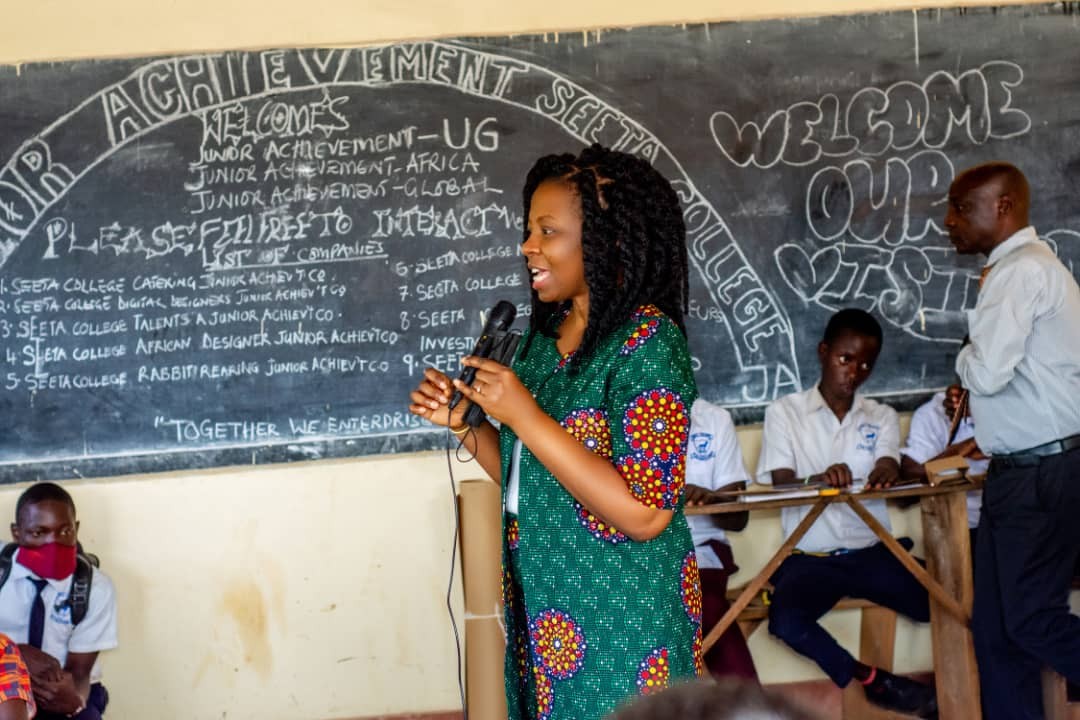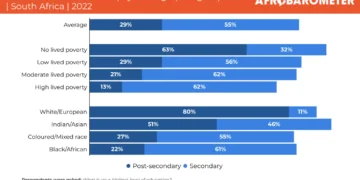
Entrepreneurship Education as a Conduit for Peace and Prosperity in Africa
Amina and her friends are children of farmers in Abaji, a suburb of Abuja. The girls often wondered why the fresh fruits and vegetables on their parents’ farms were rotting away while they could not get such fresh produce in town, and when they did, it was at outrageous prices. Then the Junior Achievement (JA) Company Program came to their school, Government Girls Secondary School (GGSS) Abaji, and the girls began learning the entrepreneurial concepts of meeting a need or solving a problem in their community through the application of design thinking principles and technology. They called their company the Amazing Amazons and developed a website and a mobile application through which they sold fresh produce from their parents’ farms directly to consumers. When they started receiving orders from customers outside Abaji, in other local government areas across Abuja, the Amazing Amazons contracted with local motorbike riders (popularly known as okada riders, who transported passengers unable or unwilling to pay for buses) to deliver produce to customers. By the time the JA Company Program wrapped up in their school that year, the girls had signed over 400 farmers to their platform, made over fourteen million Naira (NGN14M+) in sales, returned NGN11M+ to farmers, paid the okada dispatch riders over NGN1.7M and kept over NGN1.3M in profit for themselves and their shareholders. This was in 2017 when the average exchange rate just over 330 Naira to US$1.
The Amazing Amazons won the Abuja Company of the Year competition and came second in the Nigerian National Company of the Year competition, narrowly missing the opportunity to represent Nigeria at the Africa Company of the Year competition that year. At the time, I had just returned to my role as executive director of JA Nigeria and watching these girls fueled me with new energy to take our entrepreneurship education program across Nigeria, and indeed across Africa when I became CEO of JA Africa in 2020, after having hit our goal to reach one million students in Nigeria by 2020.

In a world marked by uncertainty and unrest, the role of entrepreneurship education in shaping the future cannot be overstated. It is not about turning everyone into entrepreneurs but about building skills necessary for Africa’s future leaders to lead the continent to sustainable prosperity and lasting peace.
Entrepreneurship education instills a mindset of innovation and problem-solving, crucial elements for addressing societal challenges. By nurturing the entrepreneurial spirit, we equip young individuals to identify challenging opportunities in their communities and create sustainable solutions. This proactive approach to problem-solving is a powerful antidote to the root causes of conflict, as it channels energy and talent towards constructive endeavors.
Moreover, entrepreneurship education emphasizes collaboration and teamwork. In a world where differences often lead to division, teaching young minds to work together towards a common goal fosters understanding and tolerance. Through hands-on experiences, students learn to appreciate diverse perspectives, ultimately contributing to the creation of inclusive societies that value cooperation over confrontation.
Entrepreneurs are natural peacemakers; they seek to bridge gaps and build bridges where others see only divides. As we educate the next generation of entrepreneurs, we are cultivating a cohort of leaders who not only understand the intricacies of business but also the importance of empathy, diplomacy, and compromise. These are the qualities that form the bedrock of peaceful coexistence.
Furthermore, entrepreneurship education equips individuals with resilience – an invaluable trait in navigating the challenges of life. In the face of adversity, entrepreneurs persevere, adapt, and find new pathways to success. This resilience extends beyond business and can be a driving force in overcoming societal obstacles, thereby contributing to the stability and harmony of communities.
However, entrepreneurship education has long been sidelined as a nice-to-have but not a must in African classrooms, which have favored traditional methods of education that rarely produce those skills – critical thinking, communication, collaboration skills – that have been identified by the World Economic Forum and others as necessary skills for the future of work.
It was therefore with immense pride and gratitude that I accepted the prestigious Africa Education Medal in 2023 from T4 and HP in collaboration with Microsoft, because it was important validation for entrepreneurship education across the continent. JA Africa has been at the forefront of nurturing this journey, not just to impart business skills, but as a powerful force for fostering peace in diverse and challenging environments. This medal, along with JA Worldwide’s second nomination for the Nobel Peace Prize, acknowledges the transformative impact our programs have had on the lives of countless young individuals.
As we celebrate International Day of Education, we are proud to be equipping our students with the mindset and skillset to tackle complex challenges from climate change and food security to ethnic conflict and gender issues.
Amina and her friends have finished university and are thriving. Not all are entrepreneurs, but all of them have the self-confidence that they can develop solutions to complex problems and collaborate with anyone from anywhere to generate wealth and link the prosperity of their communities to lasting peace.




































































 EduTimes Africa, a product of Education Times Africa, is a magazine publication that aims to lend its support to close the yawning gap in Africa's educational development.
EduTimes Africa, a product of Education Times Africa, is a magazine publication that aims to lend its support to close the yawning gap in Africa's educational development.

